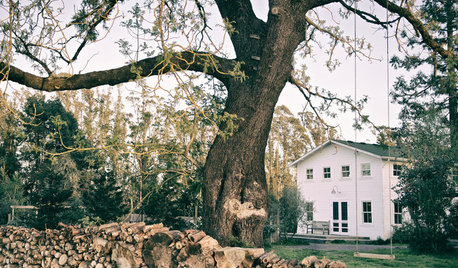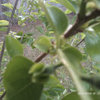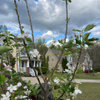One thing I like about trying to master fruit growing in home settings is that you can never do it no matter how hard you try. Keeps things interesting.
You can run with researched information but there's so much about managing a home orchard that you can't find in research based on growing fruit commercially, monoculturally and in huge scale. Often such research even leads to wrong conclusions over what kind of protection from insects and disease will be needed in a small planting.
Then there's the wisdom of experience, which is, of course, infallible... until it turns out to be wrong. How many times on this forum has someone stated something, based on his/her own experience that your own experience contradicted?
I remember a while back reading of numerous posts of great results in stopping squirrels with peanut butter and plaster of Paris bon bons. As long term members know, some of these testimonials came from the best of our gurus here who were speaking from iron-clad, multiple experiences that seemed as reliable as straight research (hey, research often takes you down the wrong alley too).
Well, the bon bons didn't work for me. Finally our own intrepid Olpea put the method to the test and his trapped squirrel seemed to suffer no consequences from a diet of ppbb's. He even kept another trapped squirrel fed with another diet nearby to act as a control.
The voles of this past winter have once again shown me how often my assumptions are incorrect. In the last twenty years, I've probably brought well over a thousand peach trees from bare roots into bearing age trees in nurseries at 5 different sites.
In that time there have been warm winters, cold winters, dry winters and heavy snow winters. I've seen girdling by pine voles, meadow voles, and rabbits on scores of trees. Rabbits always went after apples first, pears second and only barely chewed on peaches one year, one site- never inflicting serious injury to species prunus.
The voles had only damaged or killed apple trees in all this time with the pine voles girdling and eating the entire roots systems and meadow voles girdling several inches above the graft union. My nurseries are very small and not well organized so there are always different fruit tree species close together but the voles stuck with their favorites.
With all these years and sites from which to draw evaluations, you might think it a safe assumption that voles posed no serious danger to species other than Malus. That was pretty much my own conclusion.
Last year I planted a couple new nectarine varieties and a pluot in my own orchard. When this season's snow melted I discovered that they had been completely and fatally girdled. These trees were planted last year and therefore young and tender. There was a stand of same age peach trees (nursery plants) just a few feet away that were untouched. I'd been growing peach trees from bare roots in the immediate vicinity for over 20 years.
I've only recently included nectarines in my nursery, although I've been growing a couple of trees in my orchard for almost 2 decades and the pluot was the first I've ever planted anywhere, although years ago I managed a dozen different varieties at another site that never produced more than a few fruit.
So the voles only girdled the nectarines and the pluot and they had previously been mostly untested by me in terms of vulnerability to voles. Peaches nearby were untouched as has always been the case for over 20 years. Seems like a safe conclusion that voles are likely to damage malus, and nects and pluots amongst prunus, but not peaches, right?
Well, a week later I went to another small nursery that a friend allows me to grow on her land and guess what- there were a couple of peaches completely girdled, and not the youngest trees in the nursery either. There was an apple a few feet away from the girdled trees that was untouched although I'd never gotten around to protecting it. There were younger nectarines nearby that were also untouched.
This stuff happens to me all the time because I manage orchards at so many different sites. Everything from squirrels to diseases like black knot and brown rot seem to have a hundred different modus operandi that varies from site to site , and they're likely to change that MO at any time.
One poster here commented that anecdotal was my favorite word and it is an important one. I can believe my eyes but I can't trust my brain to draw accurate conclusions from what I see.















myk1
olpea
Related Discussions
Sometimes, pond cleaning ain't pretty....*shudder*
Q
'Fat' water?
Q
Simple fat-free very low calorie salad dressig
Q
14 y/o stepdaughter - habitual liar!!!
Q
alan haighOriginal Author
myk1
Scott F Smith
alan haighOriginal Author
myk1
MrClint
alan haighOriginal Author
Scott F Smith
alan haighOriginal Author
myk1
alan haighOriginal Author
MrClint
alan haighOriginal Author
alan haighOriginal Author
alan haighOriginal Author
alan haighOriginal Author
olpea
myk1
alan haighOriginal Author
MrClint
alan haighOriginal Author
MrClint
jolj
myk1
MrClint
myk1
MrClint
myk1
alan haighOriginal Author
fruithack
alan haighOriginal Author
MrClint
alan haighOriginal Author
MrClint
hoosierquilt USDA 10A Sunset 23 Vista CA
alan haighOriginal Author
Scott F Smith
MrClint
myk1
alan haighOriginal Author
MrClint
alan haighOriginal Author
olpea
marknmt
alan haighOriginal Author
myk1
alan haighOriginal Author
ravenh2001